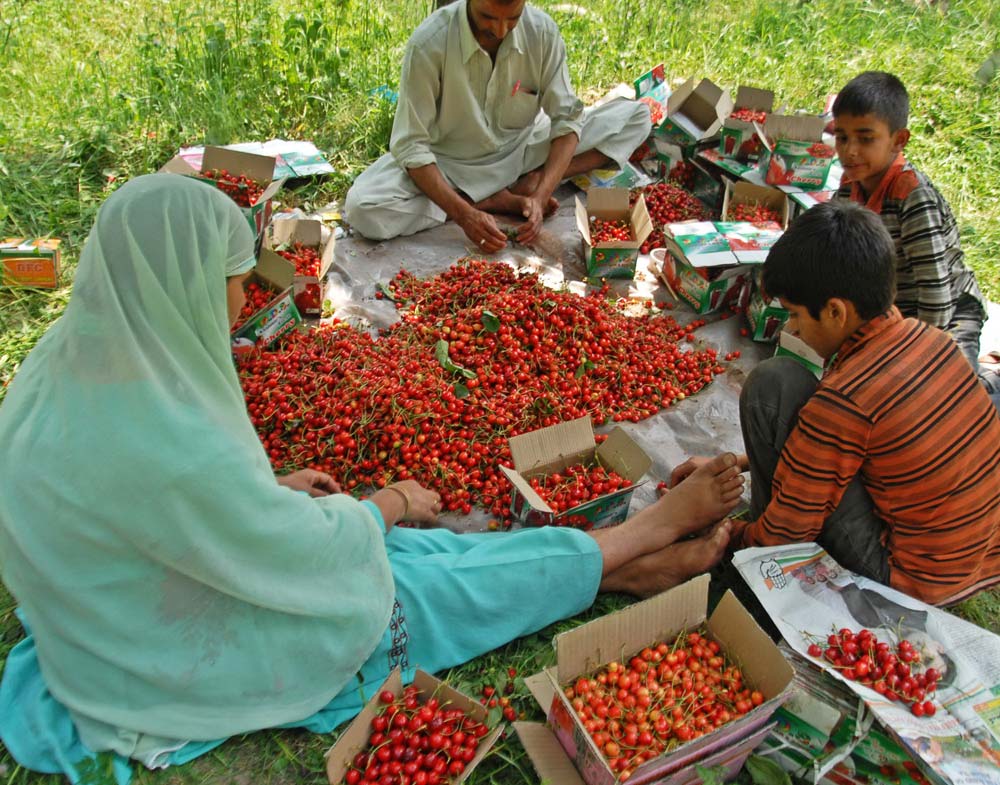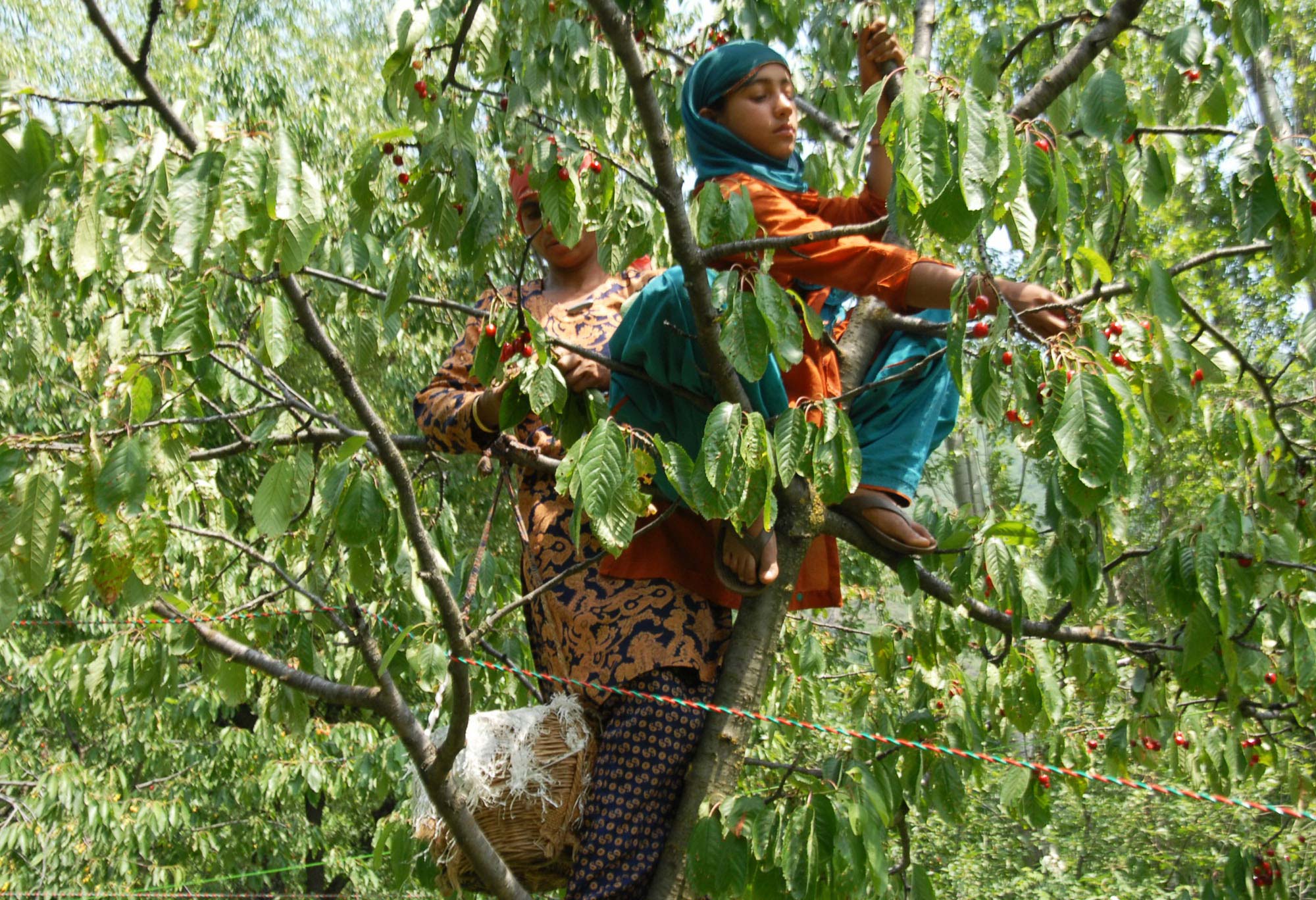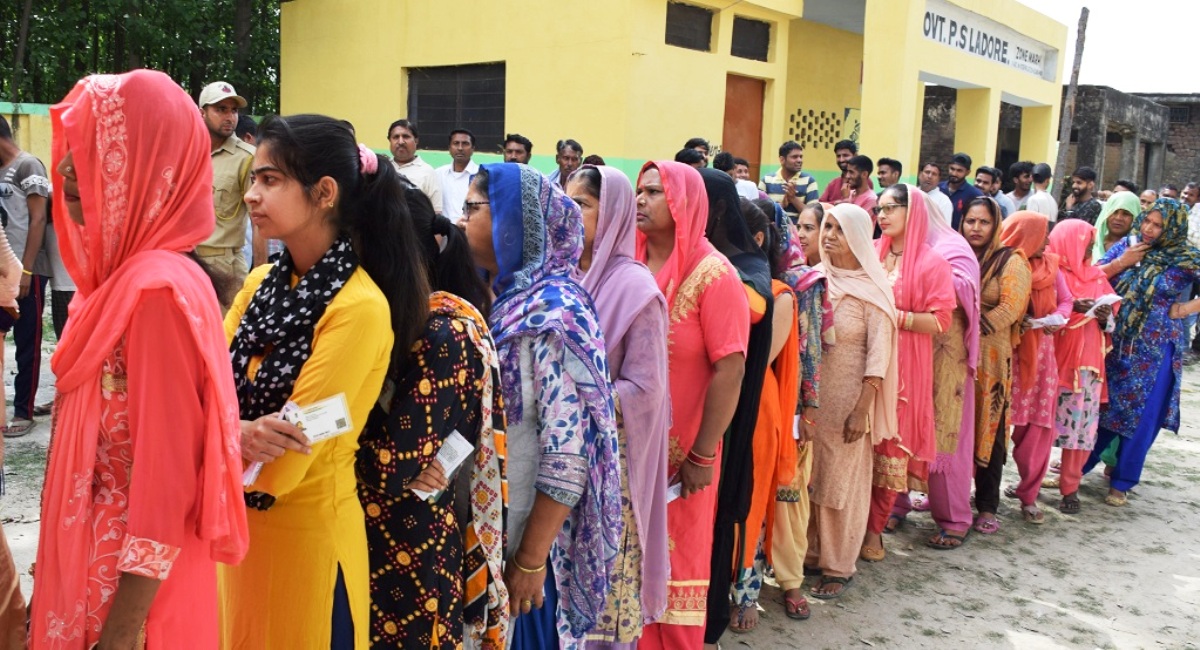by Shefali Rafiq
SRINAGAR: Freak weather conditions have sent the cherry farmers in Kashmir into distress who claim the quality of cherry has decreased this year and it could impact their returns.
Cherry is Kashmir’s second major cash crop that is harvested days after the strawberry is consumed. Its harvesting begins late May and lasts up to the first week of July.
Nearly 2,713 hectares of land are under cherry cultivation. It is usually grown in higher altitudes in locations like Nishat, Harwan, Lar, Dara and Kangan in central Kashmir. In north Kashmir, it is grown in Tangmarg, Baramulla and some parts of Shopian district in south Kashmir.
Growers said there are around six different varieties grown in Kashmir in 75 days. The initial variety that is ready for harvesting is the Avval, followed by Double, Gold Cherry, Makhmali and the last and most popular is Mishri. Mishri and Makhmali varieties are highly sought after due to their taste and natural colour, though some growers use chemicals for early ripening.
“Off late, the high density was introduced and it has hugely improved the yield and the income,” Director Horticulture (Planning and Marketing) Syed Shahanawaz Bukhari told Kashmir Life. “It is currently fetching the best rates in the market.”
“The production had reached around 11,289 and 11,789 metric tonnes in 2017 and 2018, respectively,” said an official from horticulture department. The state had witnessed a bumper crop in 2018, which fetched good revenue.
Bukhari said the production for 2019 is more than 11000 metric tonnes. It is also a bumper crop.
However, growers insist the production has declined by 30 per cent. The traders and the growers are lamenting over “huge losses” due to the low-quality yield owing to unfavourable weather conditions, especially due to the frequent hailstorms and torrential rains in the areas where it is grown in abundance.

“I don’t know if the authorities have assessed the loss but I think the damage is around 30-35 per cent in the cherry-rich belt of Shopian,” said Mushtaq Ahmad Malik, a grower and an office bearer of a local grower body.
Reports quoting deputy director horticulture department Manzoor Ahmad Dar said continuous rain and frequent hailstorms this year had damaged cherry crop in Kashmir badly. “We took precautions to minimise the losses and educated cherry growers on steps to save their yield,” he said. The demand for cherries comes mostly from outside the state, with almost 90 per cent of the exports headed to different parts of the country, especially metropolitan cities.
Cherry being a highly perishable item, it needs quick transportation to the market. Bukhari said almost forty per cent of the production is going to the outside market and the balance 60 per cent is locally consumed. The fruit is sent to outside market by road – through refrigerated vans, by rail from Jammu and by air from Srinagar. In 2018, according to Bukhari, 390 metric tonnes were sent outside by rail, 769 metric tonnes by road and 871 metric tonnes by air. “Mumbai is the main destination of Kashmir cherry crop,” he said. “We are making efforts to use all the three channels of communication,” he added.
Bukhari said in last year the growers earned revenue of Rs 29.78 crore from the cherry sales outside the state. “This year it must improve,” he said.
“The quality of the cherry was not very good this year especially of the mishri due to the rain and hailstorm,” Bashir Ahmad Basheer, the president of fruit growers association in Parimpora said.
Besides, he said the earnings are expected to go down because the authorities have increased Rs 10 per kg in the freight. Both for air and road transport. “This will add a lot to the costs of the growers,” he said. “It is mainly transported to Mumbai, Delhi, Bangalore and some parts of Punjab.”

Apart from being used in the confectionary and canned for future use, cherry is being consumed by the people for the rich ingredients it has.
Cherries are a good source of fibre, vitamins and minerals, including potassium, calcium, vitamin A and folic acid. Cherries contain antioxidants like anthocyanins and cyanidin which may have anti-inflammatory effects in case of arthritis. British researchers have found cherry juice reducing blood pressure due to its high polyphenol content. It improves sleep because of high concentrations of phytochemicals including melatonin. Cherry consumptions also impact gout attacks as it reduces blood uric acid levels.
(Shifali is an intern with Kashmir Life)















